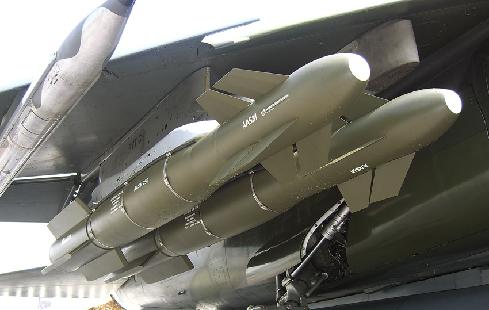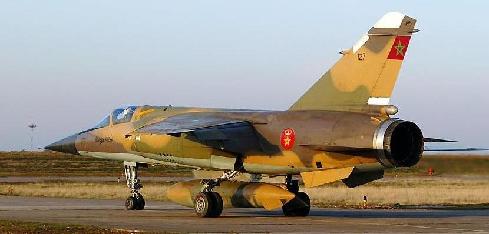[center]
Astrac modernises Morocco's Mirages[/center]

Included in rhe Astrac modernisation package of the Royal Moroccan Air Force for the Mirage F1 is the new AASM precision guided stand-off bomb, as well as
Corail flare launcher and Phimat chaff dispenser (all seen here in place). All four AASM 250 kg rocket-bombs can be launched at different targets well away from the ennemy's medium and short ranges air defences.
By Jean-Michel Guhl
in Paris, France
The 2007 Paris Air Show gave Astrac — the joint-venture created in November 2005, at the French Ministry of Defence's request, by Thales and Sagem Défense Sécurité (SAFRAN) — an opportunity to show what the new company is all about: high-level all-round upgrade refurbishing of third generation fighters.
Capitalizing on the current Royal Air Forces of Morocco’s program for the modernisation of its entire Mirage F1 fleet (a total of 27 remaining Mirage F1CH and EH), Astrac exhibited a complete offer, including
two central computers, SIGMA-type GPS-hybrid navigation systems (both developed by Sagem Défense Sécurité), MICA EM and IR air-to-air missiles provided by MBDA. For this retrofitting solution, Thales is contributing with a
RDY3 multi-function radar, a Damocles day/night laser designation pod, a PAJ FA type pod for electronic warfare self-protection and a radar Warning Receiver (RWR). The different units interface via a 1553 bus. 8)
For the air-to-air mission, the multi-function/multi-target radar can be used to fire MICA and Magic 2 missiles. To meet air-to-ground mission requirements, Astrac offers Sagem Défense Sécurité’s standoff AASM air-to-ground modular weapon supported by a mission preparation system by Sagem Défense Sécurité and a debriefing systems from Thales. The weapon can be complemented by laser guided weapons using the Damocles laser designation pod.
Astrac offer, which is compatible with NVGs, also includes a
'zero-zero' ejection seat and a
latest-generation glass cockpit MMI with Hands on Thottle and Shift (HOTAS) controls. As an option, the system can also be complemented by a system for deploying anti-ship weapons, such as MBDA’s
Exocet AM 39.
Ideal for air forces facing strong budget constraints, the Astrac modernising solution offers added value to a fighter-bomber like the Mirage F1, an aircraft which still in operational with a dozen air arms where it provides good service thanks to the reliability of its single Snecma Atar 9K50 turbojet.
Sold in about 740 copies to eleven different countries, the Mirage F1 is still in operational service today in Ecuador, France, Jordan, Libya, Spain and Morocco. A batch of those once belonging to South Africa (Mirage F1AZ) have meanwhile been sold to Gabon, about a dozen of Iraq's Mirage F1EQs 'given' by Saddam Hussein to Iran while those of Kuwait are stored and those of Qatar sold to Spain. Greece's Elleniki Polemiki Aeroporia's last Mirage F1s were retired two years ago and replaced by Mirage 2000-5 Mk.2s, the final batch of which is now being delivered by Dassault-Aviation, thus marking the end of production for the Mirage 2000 too.
So far, only the Mirage F1s of the Spanish Air Force have been fully modernised by Thales and EADS to an extent comparable with the Astrac endeavour. While about a dozen Libyan Air Force Mirage F1s are due to be modernised by Dassault-Aviation. Therefore, the modernisation market for the Mirage F1 is still very open. [Paris-06-15-2007]

One of Astrac's first modernisation programme now in full swing is the Royal Moroccan Air Force Mirage F1 contract





















